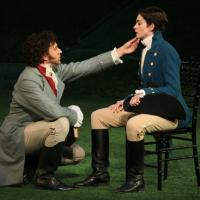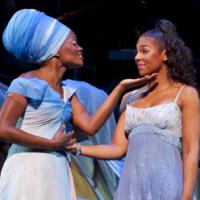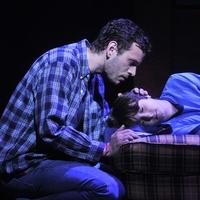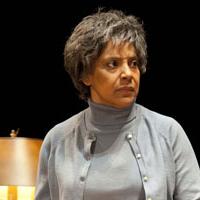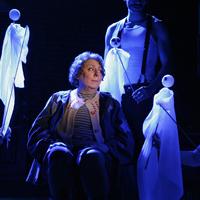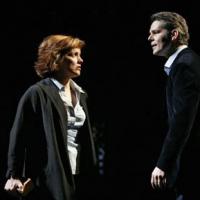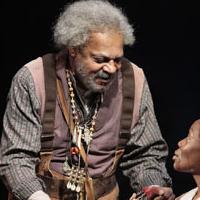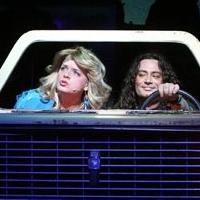Kristin Salaky - Page 5
July 3, 2009
How much you wanna bet the Weisslers will have Sarah Palin signed to play Roxie on Broadway by the end of next week?
June 29, 2009
The entirety of The Public Theater's positively scrumptious new Shakespeare in the Park production of Twelfth Night is played on and around designer John Lee Beatty's grassy field, which is dominated by two large hills. It's the kind of setting that might remind you of dozens of locales in Central Park where brave little tykes might scurry down the steep inclines or where lusty couples might settle down for a quick afternoon make-out session or where a toddler's parent might amuse his kid by popping his head out from behind the soft green hiding place. It's a playground and director Daniel Sullivan - who incorporates all the above in his lighthearted staging - seems to have encouraged his delightful company to play, making an all-star cast of theatre pros (joined by a movie star ringer with legit experience) charm like a summer stock company showing off their youthful enthusiasm.
June 25, 2009
While collectors of musical theatre trivia may be quick to mention that Anika Larsen - the cherubic-looking blonde with the belty R&B voice - was the only performer to be in both the original Broadway cast of Xanadu and the original Off-Broadway cast of Zanna, Don't!, it's her unusual upbringing that supplies the real fun facts in her very enjoyable and even thought-provoking bio-musical, Shafrika, The White Girl.
June 23, 2009
Along with contempt, familiarity is also pretty good at breeding hit Broadway musicals. Take The Wiz, for example; the perfectly pleasant but sketchily written 1975 Tony winner for Best Musical that, if it weren't based on L. Frank Baum's classic The Wonderful Wizard of Oz (which became an iconic American story once MGM got its hands on it), would probably leave audiences completely baffled as to what the devil was going on.
June 21, 2009
One of the unique and cherished aspects of the musical theatre is how the preceding plot and character development can allow a musical moment to achieve ethereal heights that establish a triumvirate of joyful feeling between audience, performer and character. Take, for example, Amalia Balash's dizzying high note at the end of 'Vanilla Ice Cream,' which is not just a showy moment for the actress playing the role, but a release of amazed emotions caused by a simple act of kindness. Or the wacky exuberance of the impromptu tango that follows Eliza Doolittle's mastery of the proper pronunciation of an Iberian precipitation phenomenon.
June 18, 2009
While the casting of Phylicia Rashad as the manipulative, pill-addicted matriarch of Oklahoma's abundantly dysfunctionAl Weston family in Tracy Letts' epic comedy/drama, August: Osage County may seem an odd choice for those who only know the actress from her television roles as the elegant Clair Huxtable on The Cosby Show and... uh... Clair Huxtable II on Cosby, she might be considered a natural for the part by New York playgoers who have seen her rip up the stage as the anguished and dominating Bernarda Alba or have observed her communicating silent volumes as a symbol of African heritage in Gem of the Ocean.
June 14, 2009
If you're old enough to recall the pre-Jimmy Carter era of American comedy, when dark pieces like Jules Pfeiffer's Little Murders and Robert Altman's MASH drew humor from a sense of being emotionally anaesthetized from the ugliness of your surroundings, you may be tricked into assuming that Theresa Rebeck's Our House is a revival of some long-forgotten black comedy with an outlandish portrayal of television news that grew more realistic decades later. But this is a new piece premiering at Playwrights Horizons and despite some high moments, some clever lines and a sharp, sexy production helmed by Michael Meyer, Our House ends up seeming innocuously nostalgic and satirically toothless.
June 11, 2009
Just in time for the centennial of the great lyricist's bar mitzvah, Mark Nadler arrives at The Metropolitan Room with a smashing celebration of the words of Ira Gershwin. Titled ...His Lovely Wife, Ira, after an infamous fopaux made by a British radio announcer, Nadler explains his mission here is to explore beyond the 'indelible ampersand attaching him to George' and honor the elder Gershwin's brilliance outside of his more gregarious brother's shadow.
June 9, 2009
While the situations presented by playwright Geoffrey Nauffts in his drama Next Fall are certainly realistic, the evening suffers from a steady feeling of contrivance as the storytelling pieces fall too neatly into place and a nagging sense that the playwright has avoided certain obvious issues that would add some needed depth to the piece.
June 4, 2009
I suppose if Bertolt Brecht and Kurt Weill ever took a crack at writing theatre for young Weimar audiences, their effort might have had a strong likeness to Stephin Merritt and David Greenspan's creepily enchanting fantasy, Coraline, receiving a production from MCC that's far too interesting for viewers to be overly concerned with the occasional bumps.
June 2, 2009
One of the many reasons I've been a fan of the Opening Doors Theatre Company since their debut production of Bring Back Birdie two-and-a-half years ago is the consistent ability of their directors and choreographers to have as many as a dozen actors singing and dancing on the small cabaret stage of The Duplex (already occupied by a piano) without ever looking crowded. But that's not a concern with their newest venture, the hilarious and tuneful Cy Coleman/Michael Stewart 1977 musical, I Love My Wife.
May 29, 2009
'Oh, I get it. That one's Blanche and that one's Stella.' 'No, wait that one's Blanche and that one's... Maggie The cat? 'Hold on... I think they're both Blanche.' These are some of the random thoughts that whizzed through my head while trying to see through the clutter of Zakiyyah Alexander's 10 Things to Do Before I Die, a game effort but a frustratingly unfocused piece receiving a well-acted premiere production via Second Stage Theatre Uptown.
May 23, 2009
Let me put it this way... If Spring Awakening was the kind of show that made you feel good about the future of the American musical, I'd say there's a fine chance you'll enjoy Bloody Bloody Andrew Jackson: The Concert Version. On the other hand, if you couldn't for the life of you stand one moment of Spring Awakening, or at the very least was of the humble opinion that it was far from the ground-breaking musical theatre revolution so many proclaimed it to be, I'd say there's a very good chance you will looooooooooooooove Bloody Bloody Andrew Jackson: The Concert Version.
May 16, 2009
It's a funny thing with musicals about women with psychiatric disorders; they seem to be more accessible when focused on the way loved ones try and achieve some kind of normalcy while dealing with the problem, rather than being about the disorder itself. Back in the autumn of '05, Off-Broadway's Transport Group premiered nor'mal:, Yvonne Adrian, Cheryl Stein and Tom Kochan exceptional musical about a family's attempt to stay functional while dealing with the teenage daughter's anorexia. Just a few weeks earlier the New York Musical Theatre Festival featured Feeling Electric, composer Tom Kitt and bookwriter/lyricist Brian Yorky's hard driving tale of a suburban mom being treated for clinical depression.
May 13, 2009
Two possibilities crossed my mind when I counted 85 selections on the song list for For Lovers Only (Love Songs... Nothing But Love Songs); either I was about to see a musical revue of Götterdämmerung-like proportions or there were going to be a lot of medleys.
May 10, 2009
Don't tell anybody in Topeka, but Sherie Rene Scott is currently in her 27th year of rumspringa. But then, since she's only half Mennonite ('Amish Light' she calls it), I suppose different rules apply.
May 6, 2009
Forgive me if it has become too old a cliché, and perhaps even an unintentional racial stereotype, to point out the enrapturing musicality of language the late August Wilson displayed in his landmark decade-by-decade cycle of plays about African-American experiences in the 20th Century. That trait is especially evident in pieces set in the earlier decades (i.e. Gem of the Ocean, Ma Rainey's Black Bottom) and seems to decrease as the years go on, demonstrating an assimilation into the established (Eurocentric) culture of the country.
April 30, 2009
A Union Square Park bench, frequently occupied by the brilliant stage and screen director Tom O'Horgan, will be dedicated in his honor this coming Sunday, May 3rd at 1pm on the occasion of what would have been his 85th birthday. The first director ever to have four productions running simultaneous on Broadway (Hair, Jesus Christ Superstar, Lenny and Inner City) passed away in January of this year.
April 27, 2009
Perhaps shows would get better reviews if they all offered critics free champagne before the performance and unlimited trips to the chocolate waterfall at intermission, but even without the edge-removing libations and shots of sugar buzz, Cirque du Soleil's Kooza, now drawing gasps and cheers under the big tent at Randall's Island, is both a soothing kaleidoscope of color and movement and a flat-out, adrenaline-surging rush.
April 25, 2009
Ah, the music of the mid-to-late 1980s. Now that was my era. The Roches, The Dead Milkmen, Loudon Wainwright III. Lining up for hours to catch Michelle Shocked at The Bottom Line. Elegant evenings of Mel Torme at Michael's Pub and Jack Jones at The Supper Club. Man, I loved that 80s music.
« prev 1 2 3 4 5 6 7 8 … 13 next »
Videos


